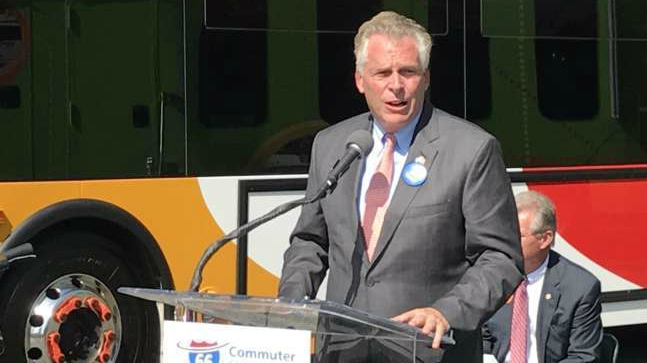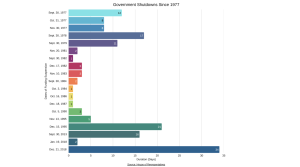Governor McAuliffe arrives in Falls Church City to inaugurate “Commuter Choice”
Terry Mcauliffe introduces the Commuter Choice Program in the Northern Virginia Center parking lot across from George Mason High School (Photo courtesy of WTOP/Michelle Basch)
October 5, 2017
Braving sweltering late summer heat, Governor Terry McAuliffe arrived at the parking lot of the Northern Virginia Center last Wednesday to announce the commencement of the newest bipartisan transportation project intended to unclog I-66.
Ms. Pam Mahony’s AP Government class was in attendance at the ceremony, as well as several Falls Church City public officials, such as Mayor David Tarter and City Manager Wyatt Shields. At its conclusion, students were able to pose for a photo op with the governor and briefly converse with their local representatives.
Commuter Choice, or the I-66 Commuter Choice Program, is a 40-year Memorandum of Agreement (MOA) authorizing the Northern Virginia Technology Council to use toll revenues from I-66 Inside the Beltway to fund multimodal transportation projects.

Boiled down, this means that funds raised from increased tolling on I-66 will be funneled into dozens of innovative projects meant to solve the Beltway congestion problem, such as carpooling tax incentives, roadway improvements, and public transit upgrades.
It has been widely acclaimed by public policy research groups and bipartisan transportation organizations, including the Northern Virginia Transportation Commission, the Virginia Department of Transportation, and its subsidiary, the Virginia Department of Rail & Public Transportation.
Surrounded by aids, advisors, and media attaches, McAuliffe promised students and local officials that the newly christened “Commuter Choice Plan” will open up space for more than 5,000 drivers on the infamously congested highway.
Mcauliffe also suggested that despite previous cost estimates for an extensive infrastructure redesign numbering in the billions of dollars, Commuter Choice will cost Virginians zero dollars in taxes.
What Virginia tax payers don’t pay in initial fees for the project will be made up for at new EZ-Pass “dynamic tolling” booths that will be installed across the Highway. Despite these costs, the program will provide hundreds of jobs and millions of dollars in revenue to the state in the years to come.
It may seem strange that a final term governor, unrestricted by concerns about future electability, would dedicate his last major policy initiative to a relatively low profile bipartisan infrastructure plan, as opposed to a final ideological push on issues such as gun control or climate change. However, the Commuter Choice initiative has been in the works for years, and McAuliffe, in the process of designing it, has subsequently been able to foster a more cooperative relationship between the Republican dominated state legislature and Democrat run state executive office.
While the future looks promising, the Commuter Choice Plan is yet to be tested beyond theory. If it can begin to remedy the crumbling Northern Virginia transportation system, one of the most contentious and problematic issues facing the state, positive public reaction could impact statewide approval of McAuliffe’s performance as governor.
This could potentially bode well for Democratic gubernatorial candidate, Ralph Northam, who has campaigned with and been endorsed by McAuliffe.
Political motivations aside, Northern Virginia’s transportation infrastructure is finally getting the government attention it has needed for decades.









